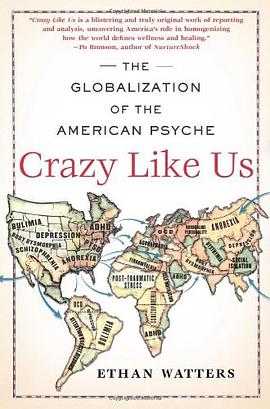Crazy Like Us
内容简介
From Publishers Weekly:
If you thought McDonald's and strip malls were the ugliest of America's cultural exports, think again. Western ideas about mental illness-from anorexia to post-traumatic stress disorder, schizophrenia, general anxiety and clinical depression-as well as Western treatments have been sweeping the globe with alarming speed, argues journalist Watters (Urban Tribes), and are doing far more damage than Big Macs and the Gap. In this well-traveled, deeply reported book, Watters takes readers from Hong Kong to Zanzibar, to Tsunami ravaged Sri Lanka, to illustrate how distinctly American psychological disorders have played in far-off locales, and how Western treatments, from experimental, unproven drugs to talk therapy, have clashed with local customs, understandings and religions. While the book emphasizes anthropological findings at the occasional expense of medical context, and at times skitters into a broad indictment of drug companies and Western science, Watters builds a powerful case. He argues convincingly that cultural differences belie any sort of western template for diagnosing and treating mental illness, and that the rapid spread of American culture threatens our very understanding of the human mind: "We should worry about the loss of diversity in the world's differing conceptions of treatments for mental illness in the same way we worry about the loss of biodiversity in nature."
......(更多)
作者简介
Ethan Watters is a free lance journalist whose work has appeared in the New York Times Magazine, Discover, Men's Journal, Spin, Details, and Wired. A frequent contributor to NPR, Watters' work appeared in the 2007 and 2008 Best American Science and Nature Writing. He co-founded the San Francisco Writers Grotto, a work space for local artists. He lives in San Francisco with his wife and children.
......(更多)
目录
......(更多)
读书文摘
用西方最新的额心理健康理论来减轻全球化进程所导致的心理压力是行不通的;因为它本身就是这个大麻烦的一部分。通过既破坏本土的疗愈信念又削弱来自当地文化的自我观念,我们正在快马加鞭地帮助这些令人更加迷茫的变化——这正是今天的世界上许多心理痛苦的最核心的问题。
......(更多)






